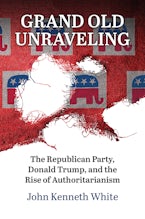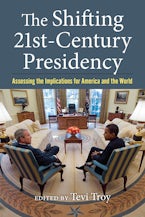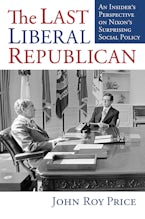"Based on a close reading of available archival materials; memoirs; newspapers; the secondary source literature in history, political science, and the law; presidential oral history projects,; and published primary sources, The White House Vice Presidency is a well-researched, thoughtful, and nuanced treatment of a crucial turning point in the history of American governance."—Political Science Quarterly
"Graceful, impeccably researched, and accessible."—The Historian
"In general, Goldstein’s analysis is remarkably insightful, exhaustively researched, and substantially persuasive. . . . In fact, it is not going too far to say that if you have one book about the vice presidency on your bookshelf, this should be it."—Perspectives on Politics
"The book is exceptionally well thought out, researched, and written. It is a true tour de force analysis of a once largely neglected institution, a fine addition to the literature on the presidency and absolutely essential to the study of the vice presidency."—Congress & the Presidency
"This analysis shows a constitutional office that has evolved into a modern day position of considerable power. In the process, the person serving as vice president has become more experienced and prepared to take over should something happen to the nation’s chief executive."—Choice
"Joel K. Goldstein’s The White House Vice Presidency is the best book ever written about that increasingly important office. It is comprehensive, literate, and polished. Surely no one knows—or has ever known—more about the vice presidency and the vice presidents than Goldstein."—Michael Nelson, author of Resilient America: Electing Nixon in 1968, Channeling Dissent, and Dividing Government
"Goldstein’s study comprehensively traces the development of the Vice Presidency, charting its evolution into an important office. The White House Vice Presidency will become the go-to study on the office for years to come."—Jeffrey E. Cohen, author of Presidential Leadership in Public Opinion: Causes and Consequences
"In this superb analysis, Joel K. Goldstein, the Dean of Vice Presidency scholars, explains how the last six Vice Presidents have transformed the office from a constitutional afterthought with a marginalized role into a powerful partnership with their presidents. You cannot understand the contemporary presidency without understanding the new role of the vice president, and Goldstein’s book presents an engaging and authoritative analysis."—James P. Pfiffner, George Mason University
“In The White House Vice Presidency, Joel K. Goldstein writes brilliantly of the evolution of the vice presidency from an office of obscurity and derision to one of enormous influence. This book will be essential reading for future presidents and vice presidents as well as those who care about how our government really works; it will be seen by scholars as the definitive work on ‘The Modern Vice Presidency.’ for years to come."—Richard Moe, Chief of Staff to Vice President Walter Mondale and member of President Jimmy Carter’s senior staff, 1977–1981
"The American Vice Presidency is long overdue for a robust reevaluation, and Joel Goldstein—the premiere chronicler of that special office—has done a brilliant job in this perceptive, wide ranging book. Highly recommended for undergraduate survey courses and graduate study as well."—Larry J. Sabato, Director, University of Virginia Center for Politics
"The Vice Presidency has long been derided—by comics and politicians alike—as a post leading to oblivion, or, as Vice President John Nance Garner said, equivalent to a ‘bucket of warm [spit].’ But the role, importance, and power of the office over the past forty years has changed dramatically. In The White House Vice Presidency, Joel Goldstein, the nation’s premier scholar of the office, gives a vivid picture of the changes, and in the process provides important insights into presidential decision-making for every occupant of the office since Jimmy Carter. His book will be the definitive guide to the office of vice president and its modern history for a long time to come." —Norman Ornstein, American Enterprise Institute Scholar and author of The Permanent Campaign and Its Future












